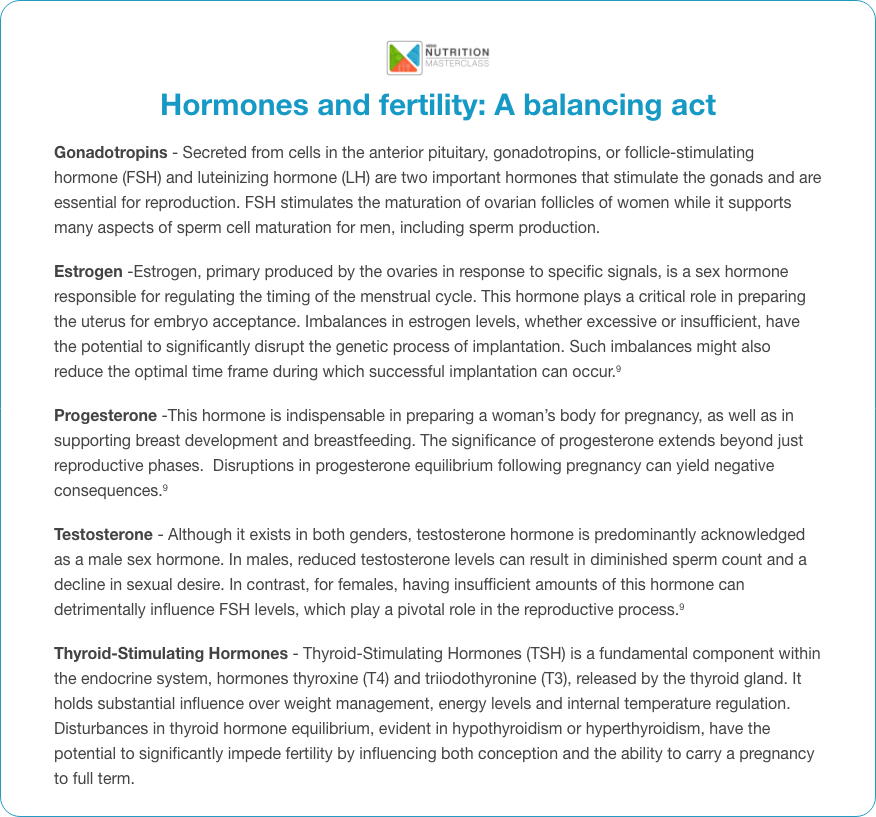Introduction

Embarking on a journey towards starting a family and opening a new chapter in one’s life is a deep personal commitment. Navigating the intricacies of parenthood from conception to birth, amid a global health crisis and other global changes, comes with a lot of challenges. As science continues to unravel a labyrinth of data on human fertility, the impact of nutrition in health has been a topic of constant discussion.
In a recent report by the World Health Organization (WHO), roughly 1 in 6 individuals worldwide experience infertility.1 Another national survey conducted by the Centers for Disease Control and Prevention in the US stated that infertility affects about 6 percent of married women who are of childbearing age.2 In fact, the current fertility rate of the world has been in constant decline for the past 4 years at a steady rate of 0.41%.3 In the Philippines alone, the fertility rate declined from 2.7 children per woman in 2017 to 1.9 children per woman in 2022.4
Several studies have shown the correlation and impact of specific nutrients and diet with reproductive health and have been strongly linked to a variety of health concerns, such as neural tube defects, among infants. While various factors contribute to fertility, it cannot be denied that nutrition is one of the emerging key players in this complex narrative. What we take in as food to nourish our bodies can directly influence reproductive function in subtle yet significant ways.
Therefore, it is crucial to understand the role of nutrition from preconception and development to delivery.
Hormones and fertility: A balancing act

Hormones directly affect weight, whether that’s gaining or losing it. To maintain a healthy and ideal weight, a delicate balance of hormones is required that’s customized for each of our unique bodily makeup. Thus, with hormonal imbalance comes the inevitable weight gain and other health complications. Understanding the relationship between weight and hormones lets us lose, maintain – or even gain, if that’s your goal – in a healthy and gradual way.
For reproductive health, hormones primarily affect every process in fertility. Hormones gone haywire may cause detrimental effects on a couple’s ability to conceive healthily. Let’s dive deeper into some of hormones' role in reproductive function.
- Gonadotropins – Secreted from cells in the anterior pituitary, gonadotropins, or follicle-stimulating hormone (FSH) and luteinizing hormone (LH) are two important hormones that stimulate the gonads and are essential for reproduction. FSH stimulates the maturation of ovarian follicles of women while it supports many aspects of sperm cell maturation for men, including sperm production.
- Estrogen – Estrogen, primary produced by the ovaries in response to specific signals, is a sex hormone responsible for regulating the timing of the menstrual cycle. This hormone plays a critical role in preparing the uterus for embryo acceptance. Imbalances in estrogen levels, whether excessive or insufficient, have the potential to significantly disrupt the genetic process of implantation. Such imbalances might also reduce the optimal time frame during which successful implantation can occur.9
- Progesterone – This hormone is indispensable in preparing a woman's body for pregnancy, as well as in supporting breast development and breastfeeding. The significance of progesterone extends beyond just reproductive phases. Disruptions in progesterone equilibrium following pregnancy can yield negative consequences.9
- Testosterone – Although it exists in both genders, testosterone hormone is predominantly acknowledged as a male sex hormone. In males, reduced testosterone levels can result in diminished sperm count and a decline in sexual desire. In contrast, for females, having insufficient amounts of this hormone can detrimentally influence FSH levels, which play a pivotal role in the reproductive process.9
- Thyroid-Stimulating Hormones – Thyroid-Stimulating Hormones (TSH) is a fundamental component within the endocrine system, hormones thyroxine (T4) and triiodothyronine (T3), released by the thyroid gland. It holds substantial influence over weight management, energy levels and internal temperature regulation. Disturbances in thyroid hormone equilibrium, evident in hypothyroidism or hyperthyroidism, have the potential to significantly impede fertility by influencing both conception and the ability to carry a pregnancy to full term.
The endeavor to uphold hormonal balance in relation to nutrition and fertility mirrors an endless loop: irregularities in hormone levels might arise due to detrimental dietary choices, which include processed foods, elevated simple sugar content, and inadequate fiber intake, as well as stress and sedentary habits. These then can affect and hamper a healthy and natural conception.
Weighing in: When too much becomes bad
Maintaining a healthy weight is a dilemma that many struggle with. What is clear though, is the direct effect of increased weight beyond the ideal range has on fertility. In fact, obese men have about 42% chance of low sperm count and an 81% chance of not producing any sperm at all. The increase of fat cells in the body causes a significant reduction of testosterone,5 a hormone needed for the production and development of mature sperm. Another study on sperm DNA damage cited that disruption in adipokines, a molecule that signals the metabolic status of the body, including obesity and inflammation can lead to sperm damage.6
In female fertility, nutrition is given even more significance. In the context of obesity, adipocytes function as an endocrine organ. As a result, adipose tissue releases specific hormones that engage with biochemical pathways, including but not limited to insulin resistance, inflammation, hypertension, cardiovascular vulnerability and coagulation as well as oocyte differentiation and maturation.7 To simplify, women who carry excess weight beyond the recommended range encounter heightened risks of infertility. This surplus of weight can lead to complications such as varying degrees of hormonal imbalances, impaired endometrial implantation and disrupted reproductive functions. Additionally, it contributes to a spectrum of reproductive issues like delayed conception, increased miscarriage frequency and reduced effectiveness of assisted conception procedures. One example of reproductive health issues that affect women is Polycystic Ovary Syndrome (PCOS), characterized by irregular ovarian activity and frequently resulting in failed ovulation.
What’s on my plate: Eat your way to a healthy conception

There are substantial connections between diet and fertility. Trans fats, refined carbohydrates and added sugars both affect male and female fertility. About 50% of infertility cases are attributed to low sperm counts in men, while 35% involve women exclusively. So, let’s explore how nutrients can make a positive impact on fertility.13
- Folic Acid – is an important B vitamin that plays a major role in cell regeneration and helps make new cells for skin, hair and nails. This nutrient, abundant in rice, pasta and bread is essential in preventing major birth defects during pregnancy. Studies have shown that supplementation of folate provides a higher probability of live birth for women undergoing Assisted Reproductive Technology (ART).17
- Vitamin A – The role of this nutrient has been recognized since the early 1900’s. Vitamin A is one of the key players in improving the quality of embryo and plays a major role in the male genital tract and spermatogenesis as well.18
- Vitamin C and Zinc – This pair of antioxidants plays an important role in male fertility. Known to help prevent cell damage, vitamin C plays a vital role in sperm quality and improved motility while zinc is critical in proper hormone metabolism for males and sperm production.19
- Vitamin E – Vitamin E is an essential nutrient throughout the reproductive process. In male reproductive health, alongside vitamin C and zinc, vitamin E helps with sperm motility and preserves sperm health since it is a potent antioxidant that prevents free radicals. Foods high in vitamin E such as plant oils and nuts are known to have significant positive effects in preserving reproductive health among women. Vitamin E also reducing the risk of developing reproductive disorders due to its antioxidant effect.21
- Selenium – Another equally important mineral that is commonly missed out in fertility nutrition is selenium. Selenium affects the thyroid gland function and acts as an antioxidant to reduce oxidative stress in the body. It may also possibly influence the growth and maturation of egg cells.20
- Vitamin D – Vitamin D helps in improving the quality of reproductive health for both men and women. Several studies have shown that a sufficient amount of vitamin D in adult males presents a positive association with testosterone levels. For females, having an appropriate pool of this vitamin influences the outcome of in vitro fertilization (IVF) and helps the fetus get the amount needed for growth during pregnancy.15
- Calcium – It is known that calcium is good for bone health. However, another important function of this mineral involves muscle contraction and intracellular processes that directly affect male fertility. Calcium is also crucial for the maximum motility of sperm cells and the fertilization process.16
- Iron – Women are more vulnerable to iron deficiency and has become a common problem particularly to those who are malnourished during their reproductive age. Not having enough iron in the body depresses ovary functions, particularly the follicular development.23 Although studies on ferritin, a blood protein that contains iron, and unexplained infertility among women still needs to be explored, it is proven that iron homeostasis have an impact in improving the reproductive health among women of child-bearing age.22
- Antioxidants and fatty acids – Monounsaturated fatty acids, primarily oleic acid, along with flavonoids and polyphenols, which are found in plant-based foods, fish, nuts and healthy grains are important anti-inflammatory components that prevent cell damage. Reduced inflammation has a positive impact on fertility chances and better quality of conception and pregnancy.14
Tips/recommendation
Good nutrition should be at the center of every family planning to start their fertility and conception journey. Staying healthy through food and establishing healthy habits is one of the easiest and at the same time challenging commitments soon to be parents can do. Beyond managing weight, it is necessary to abide by a holistic approach to a healthy and sustainable lifestyle.

- Eat on a rainbow – No single food provides all the essential nutrients our body needs. A diverse plate boosts nutrient density and is crucial to improving overall health. Mix and match foods for enjoyment and maximize nutrient intake. Opting for a colorful plate is a simple way to achieve this:
- Yellow and orange – Carotenoids and vitamin C are abundantly present in apricots, cantaloupe, carrots, corn, grapefruit, mango, orange, papaya, potato, squash and turmeric root. These foods have powerful antioxidants that prevent oxidative stress and increase both egg and sperm quality. They also boost the immune system as well as help regulate menstrual cycle.
- Green – Leafy vegetables such as bok choy, broccoli, lettuce, spinach and greens such as peas, avocado and beans are just a few sources of vitamin B complex, iron, calcium, and zinc that are essential for reproductive health.
- Red – Apples, cherries, pomegranates, radishes, raspberries, strawberries and tomatoes are rich in phytonutrients such as lycopene and Vitamin C. Phytonutrients are potent anti-inflammatory sources that help protect against cell damage. This may also help reduce DNA damage and improve sperm quality significantly.
- Blue and purple – Eggplants, blackberries, beetroot, blueberries, grapes and red cabbage are potent with anthocyanins and folate that help create healthy eggs and sperm while supporting proper blood flow in the body.
- Brown – Cauliflower, garlic, onions, mushrooms and turnips contain polyphenols that help reduce inflammation and balance hormones. Cauliflower helps metabolize estrogen which is an important hormone in reproductive health.
- Embrace the power of hydration – Having enough fluids plays an impactful role in our health. Not only does it help in eliminating waste materials out of the body seamlessly but also and most importantly, it delivers oxygen and nutrients to the cells to help them function well.
- Eat mindfully – This involves cultivating habits that serve as pivotal drivers for enduring transformations as we go through the different stages of life. By fostering consciousness around dietary selections and managing consumption patterns, the journey towards change becomes easier for the long haul. Kickstart this journey by meticulously documenting meal timings, consciously practicing the art of chewing, and chronicling your emotional states during the consumption of specific foods.
- Improve gut health – Our digestive system is home to trillions of microbes that are essential for a healthy gut. Feeding our gut with healthy probiotics and prebiotics found in fermented food such as kimchi, sauerkraut and yogurt not only improves the absorption of nutrients in our body but also helps prevent other conditions that may affect our reproductive health.
- Balance stress with activities – Stress is part of everyone’s daily life. How we manage our stress and keep negative thoughts at bay, helps us achieve equilibrium to function and perform optimally. A helpful practice is ensuring that we have an exercise regimen we can keep for long-term, highlighting the positive impact exercise has on hormone balance and mood management.
The Mediterranean diet is one of the most preferred and recommended diets for an overall healthier lifestyle. Its nutrition and even fertility benefits are well-established. In addition to considering calorie intake, placing emphasis on the quality of food selection greatly contributes to enhancing overall health and lifestyle.
Message to RNDs



 Faith Nacional-Rahi , RD-RND
Faith Nacional-Rahi , RD-RND














No comments here yet.